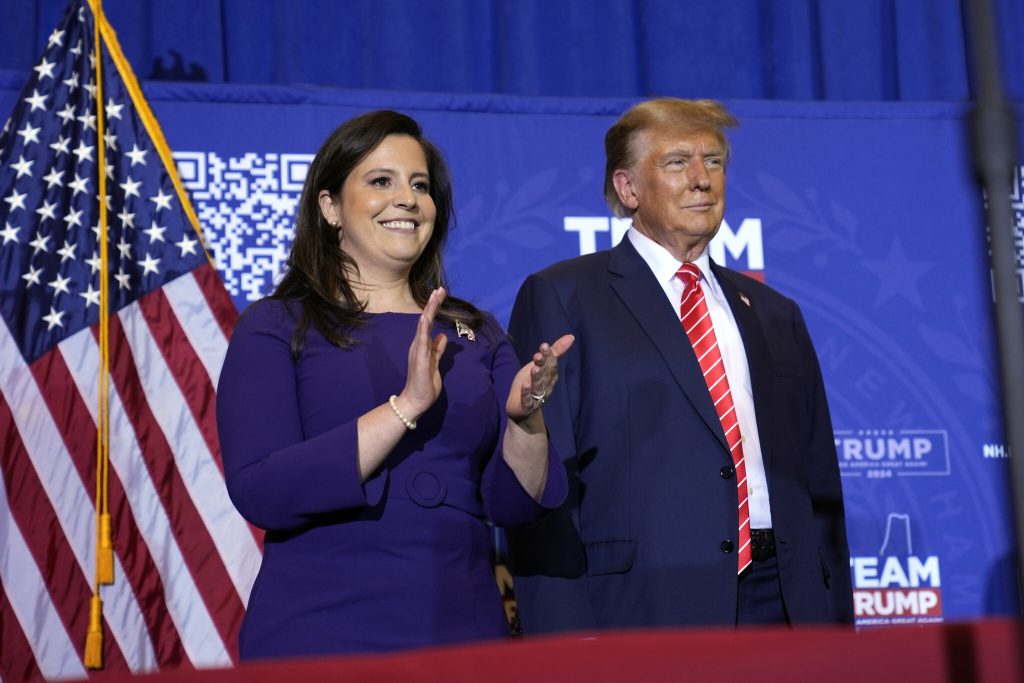President-elect Donald Trump has announced that he has selected Rep. Elise Stefanik (R-NY) as his nominee for U.S. Ambassador to the United Nations. Stefanik, currently the fourth-ranking House Republican, has been one of Trump’s staunchest allies in Congress and played a significant role in the GOP’s legislative efforts during his presidency.
“I am honored to nominate Chairwoman Elise Stefanik to serve in my Cabinet as U.S. Ambassador to the United Nations. Elise is an incredibly strong, tough, and smart America First fighter,” Trump said in a statement confirming the nomination, which was first reported by CNN. Stefanik, who represents New York’s 21st Congressional District, is known for her leadership as Chair of the House Republican Conference and her vocal support of Trump’s policies.
Stefanik’s political career has been marked by her evolution from a moderate voice to one of Trump’s fiercest defenders. When she was first elected to Congress in 2014, at the age of 30, Stefanik was heralded as a rising star with a reputation for bipartisanship and pragmatism. Initially, she was viewed as a self-styled independent voice, and she was praised for her ability to work across party lines. At the time, she even earned praise from former House Speaker Paul Ryan, who called her a “builder” in an era of increasing partisanship.
However, as Trump ascended to the presidency, Stefanik’s relationship with him transformed. During his first term, she became one of Trump’s most vocal defenders in Congress, particularly during the impeachment hearings of 2019. Her aggressive and outspoken support of Trump during those proceedings earned her national recognition and solidified her position as one of his key allies. Trump himself referred to Stefanik as a “Republican star” after her performance in the hearings.
Stefanik’s support for Trump only grew in the aftermath of the 2020 presidential election. Despite Joe Biden’s victory, Stefanik was one of the House Republicans who objected to the certification of Biden’s win and promoted Trump’s unfounded claims of election fraud. This loyalty to Trump has helped elevate her within the Republican Party, particularly as she became the first woman to lead the House Republican Conference in May 2021, succeeding Rep. Liz Cheney (R-WY), who was ousted for her outspoken criticism of Trump’s election falsehoods.
But Stefanik’s path to becoming one of Trump’s closest allies wasn’t always a straight line. Early in Trump’s political career, she had expressed skepticism toward him, particularly during the 2016 Republican primaries, and had been critical of his rhetoric. She also voted against his signature 2017 tax reform plan, a decision that highlighted her previous reputation as a more independent, centrist Republican.
Despite this, Stefanik’s political trajectory shifted as Trump’s popularity grew, especially in her upstate New York district, which has a large conservative base. Her shift from critic to loyalist was strategic, as it helped her maintain and expand her political influence within the party. By the time Trump announced his 2024 presidential campaign, Stefanik was among the names floated as a potential running mate, a role she openly expressed interest in. She has since become one of Trump’s most prominent surrogates, frequently defending his agenda and policies.
In addition to her work on the Republican side of the aisle, Stefanik has served on several important congressional committees, including the Armed Services Committee and the House Permanent Select Committee on Intelligence. She has also been active in advocating for issues such as combating antisemitism, and she made headlines in 2022 for calling on college administrators to take stronger stances against hate speech during a House hearing.
Trump’s selection of Stefanik for the UN ambassadorship follows his decision to not invite Nikki Haley, who served as UN ambassador during Trump’s first term, back into the role. Haley, the former governor of South Carolina, had been a prominent figure in the Trump administration but later ran a primary campaign against him for the 2024 election before endorsing him.
Stefanik’s nomination marks the culmination of her transformation into one of the leading voices in the Republican Party, closely aligned with Trump’s populist and “America First” agenda. As the new U.S. Ambassador to the United Nations, Stefanik is expected to continue advocating for Trump’s foreign policy priorities on the global stage, further solidifying her position as a central figure in the future of the Republican Party.







